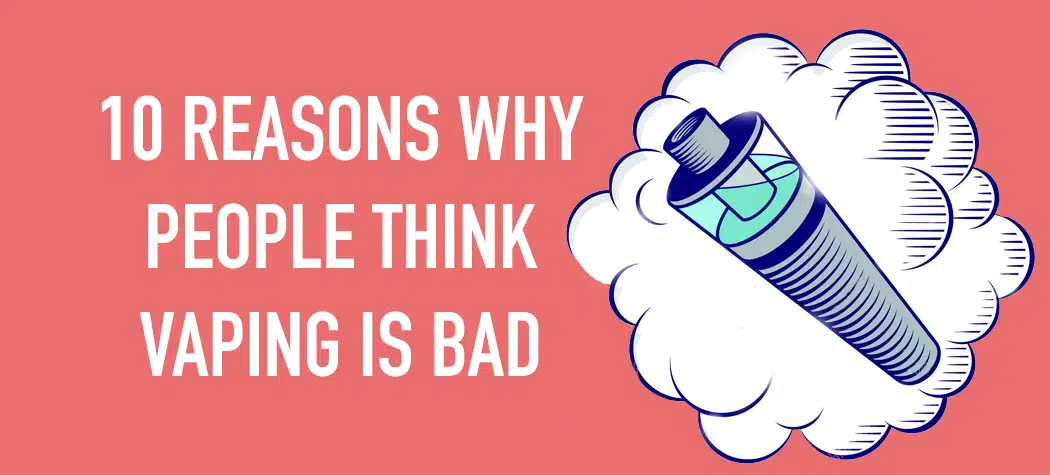Industry Research, Getting Started
10 Reasons Why People Think Vaping Is Bad?
Despite mounting evidence from the UK showing that vaping is at least 95% safer than smoking and works as a quit tool, some still strongly oppose e-cigs and tobacco harm reduction.
Mounting independent evidence from the United Kingdom shows that vaping is “at least 95% safer” than smoking, according to Public Health England and the Royal College of Physicians. Also, gold-standard research demonstrates e-cigarette liquids work as a quit tool. Despite this, some still strongly oppose the use of electronic cigarettes and tobacco harm reduction – so why do people still think vaping is bad?
Dr Colin Mendelsohn is an Australian expert who has worked in tobacco treatment for over 35 years. He teaches health professionals about smoking, writes articles in peer-reviewed journals, conducts research, and advocates for tobacco harm reduction and vaping.
Recently, Dr Mendelsohn published the book Stop Smoking Start Vaping, where he details “the healthy truth about vaping”. In it, he addresses the top ten reasons why some resolutely stick to their strong, vocal opposition to electronic cigarettes.
1). An Abstinence-only Ideology around Harm Reduction
While the UK was swift to adopt the harm reduction approach that worked so well for sexually transmitted diseases, Dr Mendelsohn’s Australia and many other countries only promoted complete abstinence. America has relaxed laws applied to cannabis yet is working to all but ban vaping.
Dr Mendelsohn said: “Australia’s zero-tolerance of nicotine is not consistent with our approach to other forms of harm reduction. We accept the use of methadone for people who use heroin but not clean forms of nicotine to reduce the harm from smoking”.
2). A Plea to Morality and Moral Outrage
“Some opponents of vaping believe that any use of an ‘addictive’ substance is wrong,” comments Dr Mendelsohn.
If it looks like a cigarette it’s bad, so too if it contains nicotine, but the worst crime of all is if someone enjoys vaping.
Professor of Public Health Ken Warner says there is “a distinctly puritanical streak within the public health community” that seeks to punish, coerce and stigmatise.
3). Competing Values And Priorities
“Vaping is not as pure as mountain air and long-term use may cause some harm to the lungs,” says Dr Mendelsohn, and this means that the benefits to long-term smokers are irrelevant to those worried about teens taking up vaping.
“Policy on vaping should be based on its overall impact on public health, not on areas of narrow interest. The small potential risk of vaping to young people is dwarfed by the substantial and immediate benefits of quitting by adult smokers.”
4). The Big Tobacco Industry and Government Lobbying

Public Health officials have a long-held hatred of the tobacco industry. As soon as they saw these businesses entering the vape market they immediately believed electronic cigarettes must be bad and nothing would convince them otherwise.
Harm reduction expert Clive Bates said: “The war on smoking morphed into a war on nicotine. The machine built for fighting smoking swivelled its gun turrets and started blasting away at the new products and their supporters.”
Dr Mendelsohn added: “The tragic irony is that those who oppose vaping are supporting the very thing they are trying to eradicate: combustible cigarette sales. Vaping is a disruptive threat to the very existence of the tobacco industry, just like renewable energy is to fossil fuels.”
5). Individuals & Organisations Self-Interest
Individuals and organisations that have grown up fighting tobacco use now find either their funding or relevance is being threatened by the new disruptive technology, according to Dr Mendelsohn.
To maintain their status and revenue streams, they perform convoluted mental gymnastics to link vaping to smoking, ignoring or distorting scientific evidence – or worse, funding poor quality research aimed at producing negative results. Some Universities in the United States now specialise in this kind of poor practice.
6). Global Politics & Poor Communication
Dr Mendelsohn points out that no politician likes to take measures that are unpopular with the public. Therefore, it is easy to score political points when attacking the tobacco industry or doing something to “protect our children”.
“Public health policy should always be based on the best available scientific evidence. However, in reality, this only seems to occur when the evidence aligns with political objectives,” comments Dr Mendelsohn.
7). Groupthink
“Groupthink operates within public health organizations and is a powerful and disruptive force,” explains Dr Mendelsohn. “Even smart people with good scientific literacy interpret the evidence selectively to reach a view that is consistent with the views and identity of their tribe.
“They dismiss evidence that undermines the group beliefs. Compliance is understandable. Taking a contradictory view on vaping risks career and funding opportunities, and disapproval from peers.”
8). Fear Of Change And The New Technology
Change is frightening, especially change that involves new and unknown technology.
Innovation expert Professor Calestous Juma wrote: “Claims about the promise of new technology are at times greeted with scepticism, vilification, or outright opposition—often dominated by slander, innuendo, scare tactics, conspiracy theories, and misinformation. The assumption that new technologies carry unknown risks guides much of the debate. This is often amplified to levels that overshadow the dangers of known risks.”
9). Financial Implications (Taxes)
Dr Mendelsohn says tobacco taxes raised AUD$17.4 billion in Australia in 2019-20. Revenue from cigarette sales is vital to American states that took out loans against future taxable income. These huge sums are lost when smokers switch to vaping.
This leaves organisations and governments vulnerable to undue influence from rich benefactors. We have seen a billionaire with a staunchly anti-harm reduction philosophy influence the World Health Organisation, bribe government officials, and attempt to influence policy through funded bodies.
10). Quit Products Should Be Medicines
“The traditional medical model involves going from smoking to complete abstinence as a medical treatment, with professional support and counselling and pharmaceutical aids,” says Dr Mendelsohn.
Vaping challenged this model as smokers switched without support or the need for medical intervention. Harmful behaviour was swapped for one that is dramatically safer.
Dr Mendelsohn concludes: “Vaping allows them to continue to enjoy nicotine as well as the many rituals, sensations and social pleasures of smoking. They learn about vaping from other vapers, Facebook groups and online reviewers. Many appreciate the supportive subculture and hobby component of vaping. Success is when smoking is eliminated.”
These were the 10 reasons people oppose electronic cigarettes
The UK is blessed to have a broad base of independent scientists focussed on finding out the truth about e-cigarette use and politicians who believe in a harm reduction approach. Slowly, others are coming to see the benefits of embracing vaping and changing their legislation – Thailand and The Philippines being two of the most recent. Millions of UK smokers have become ex-smokers thanks to e-cig technology, there is a billion more around the world waiting for help.
